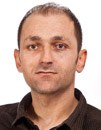Odjel ima studentske ogranke na sveučilištima u Osijeku, Rijeci i Zagrebu.
Odjel za upravljačke sustave
Odjel ima studentske ogranke na sveučilištima u Osijeku, Rijeci i Zagrebu.
Hrvatska sekcija IEEE, ACROSS centar, CS i RA odjeli, pozivaju vas na predavanje:
“Bio-inspired Robotic Entities: Coping with Bounded Rationality”
koje će dr.sc. Nikos Tsourveloudis, profesor na Technical University of Crete (TUC), Chania, Greece, održati u srijedu, 19.12.2012, u Sivoj vijećnici FER-a, s početkom u 9:30 sati.
Biografija predavaca i sazetak predavanja nalaze se u nastavku vijesti.
Summary: The fundamental motivation of bio-inspired multi-robot teams is the ability of living organisms to successfully cope and provide good solutions to almost all robotic related problems. Navigation, material handling, sensors, machine learning are only some of the research areas benefited from examining and adopting methodologies, techniques or mimicking behaviors proved sustainable and successful for animals and humans.
The research that will be presented in this talk is an outgrowth of previous research on the navigation and control of autonomous robots. The objective will be to present, define and discuss the required level of cognitive capabilities needed for robotic navigation and coordination purposes. As an extended example we will follow the bio-inspired paradigm of hunting animals (wolves), intending to make this knowledge applicable to the coordination problem of heterogeneous robotic teams.
Emphasis will be given on the fact that humans and animals make inferences about unknown features of their world under constraints of limited time, limited knowledge, and limited computational capacities. And despite their cognitive limitations (bounded rationality) tend to built and use domain specific heuristics that allow for fast “problem solving” (and task specific successful behaviors). How can robotics be benefited from these facts? This and related topics will be discussed.
Dr. Nikos Tsourveloudis is a professor of manufacturing technology at the Technical University of Crete (TUC), Chania, Greece, where he leads the Intelligent Systems and Robotics Laboratory (www.robolab.tuc.gr ) and the Machine Tools Laboratory.
His research interests are mainly in the area of autonomous navigation of field robots. His teaching focuses on manufacturing and robotic technologies and he published more than 100 scientific papers on these topics. Dr. Tsourveloudis serves in the editorial board of numerous scientific journals and conferences. He is a member of professional and scientific organizations around the globe, and several public organizations and private companies have funded his research.
Dr. Tsourveloudis’ research group has been honored with several prizes and awards for their research efforts and also for transferring academic knowledge into real industrial prototypes. The most recent awards include: the 3rd EURON/EUROR Robotic Technology Transfer award (2009), the 1st Car Safety award at the Shell Eco Marathon in 2010 and 2011, the Excellent Research Achievements award by the TUC (2010) and a Chair-of-Excellence in Robotics awarded by the University Carlos III of Madrid and the Santander Bank, Spain (2011).
Related Websites: www.tucer.tuc.gr


